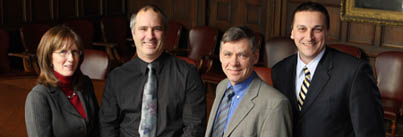Who you gonna call? 3000!
University Safety to issue emergency measures guide

Louise Savard, Director, University Safety; Claude Lahaie Manager, Waste Management Program; Wayne Wood Associate Director, Environmental Health and Safety; Pierre Barbarie, Associate Director, University Safety.
Owen Egan
In the wake of the shootings at Dawson College, Virginia Tech and other schools, McGill University Safety has answered the call to boost emergency preparedness on campus.
“All these incidents brought to light how vulnerable we are and how quickly an incident can happen,” said University Safety Director Louise Savard. “It was clear there was a great need for emergency measures and for us it was instinctive that we would need a written plan that everyone would know about.”
That clarity led to the creation last year of Emergency Measures and Fire Prevention Services, which, along with the Environmental Health and Safety Office and Waste Management, falls under the umbrella of Savard’s University Safety group.
Savard soon put together a task force that looked at what other universities were doing. This led to the publication of a one-page handout listing emergency procedures for the McGill community and, specifically, who to call in the event of such situations as fire, the presence of a hostile intruder on campus or a hazardous materials spill.
In most cases, the answer is simple: dial 3000, which is the McGill University equivalent of 911.
“The number 3000 is answered 24/7 by people who will know who and where you are because of our call display system, which is a big advantage,” she said. “We want to make sure the community knows if you have a situation you need to deal with, whether it’s an intruder or you have a flood and are worried that it will turn into mould, there are people right here on campus you can call.”
She’s quick to add that calling 3000 doesn’t mean there’s no need to dial 911.
“If it’s a serious emergency, it’s always a good idea to call 911 first, but then you should also take the time to call 3000. There’s nothing stopping someone at 3000 from saying, ‘This sounds like a serious emergency; we need to call 911.’ ”
The one-pager was a first step in a process that will soon culminate in a written emergency management plan and a guide book on what to do in the event of an emergency. The booklet is to be made available throughout the university community this year.
“My intention is that people will at least leaf through it and the next step will be to offer training across the community from the top down. And then we will spend a couple of years just reinforcing the message.”
It’s all a matter of being safe rather than sorry.
“We don’t have that many issues on our campus. Students feel very safe here, but that means they don’t always take proper precautions. In an ideal world on campus, people would look after their stuff, themselves and each other.”

